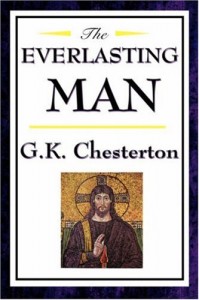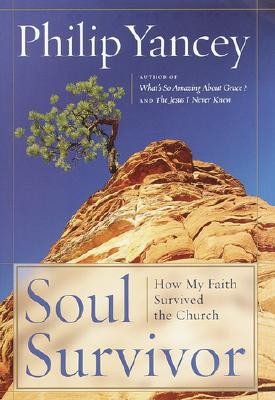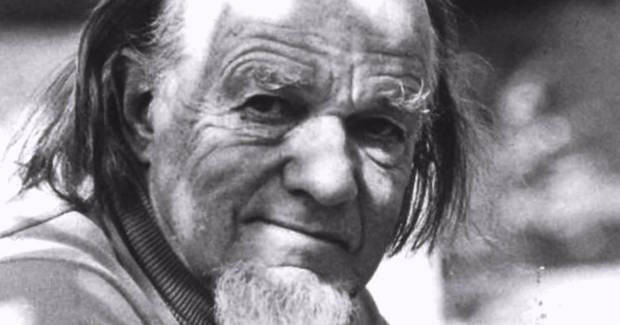The Everlasting Man
 The Everlasting Man (1925) is G.K. Chesterton’s response to H.G. Wells’ Outline of History. Chesterton took issue with Wells’ evolutionary interpretation and his ensuing book is one of the ten C.S. Lewis credited as most influential in his intellectual life, spiritual history and vocation.
The Everlasting Man (1925) is G.K. Chesterton’s response to H.G. Wells’ Outline of History. Chesterton took issue with Wells’ evolutionary interpretation and his ensuing book is one of the ten C.S. Lewis credited as most influential in his intellectual life, spiritual history and vocation.
What comes to mind first is a question: what would Chesterton think of one such as I “reviewing” his book? I feel completely inadequate. His learning is immense in both breadth and depth, his wit superlative, his good nature and brilliance so far beyond me that they leave me panting in a heap beside the road. And he’s not even laboring. There is simply no one who writes like this today.
Rather than a review, I’m offering a few impressions — a mere signpost saying, “Janet was here: 3/12/11.” This marks my first encounter with a book I’m sure I’ll revisit.
The Everlasting Man is a history and apologetic. Chesterton, pointing out that most criticisms of the church are myopic, steps back and takes us on a tour of world history from the allegedly savage cave man through the early 20th century, making comparisons between civilizations, eras, philosophies and mythologies. In some ways The Everlasting Man is a fuller elaboration of the ideas in Orthodoxy, telling a universal story rather than a personal one.
Nowhere do we hear what Lewis later would term “chronological snobbery;” Chesterton has a deep respect for humanity, and part of what he argues against is the condescending interpretation of the historian who says early humans are simply uncivilized animals. “Man is not merely an evolution,” writes Chesterton, “but rather a revolution.” In Orthodoxy, Chesterton wrote that it was a commonplace that apes and men are physically similar, but their differences are much greater: “That an ape has hands is far less interesting to the philosopher than the fact that having hands he does next to nothing with them.” For Chesterton, the physical likeness is subordinate to the defining qualities of soul and universal spiritual longings that set men apart. In the terms of this book, these longings are what define “everlasting humanity.”
And it is Christ, the “everlasting man,” who fulfills them. The first half of the book is a discussion of history; the second half is a discussion of Christ and what makes him unique among all the mythic figures and philosophical teachers (defining such terms is part of Chesterton’s business here) that came before:
Right in the middle of all these things stands up an enormous exception. It is quite unlike anything else. It is a thing final like the trump of doom, though it is also a piece of good news; or news that seems too good to be true. It is nothing less than the loud assertion that this mysterious maker of the world has visited his world in person. It declares that really and even recently, or right in the middle of historic times, there did walk into the world this original invisible being; about whom the thinkers make theories and the mythologists hand down myths; the Man Who Made the World. That such a higher personality exists behind all things had indeed always been implied by all the best thinkers, as well as by all the most beautiful legends. But nothing of this sort had ever been implied in any of them…
This passage is in the conclusion, so it provides a glimpse of the ground Chesterton has covered as well as a sample of his exuberant writing. As I approached the middle of the book, I said to myself that I liked the earlier chapters best, where the ancient civilizations we’re studying in history were lifted up and compared like tokens on a world map. But by the time I finished, I had changed my mind. It’s the way Chesterton writes about Jesus that shines. Better than anything I’ve ever read, this book catalogs the uniqueness and grandeur of Jesus on the stage of world history.
Though it’s food for the mind and soul, it takes serious work to read. In all honesty, it absolutely has to be read twice — once for the general sweep of the argument, then a second time for a fuller consideration of the details.
I read it on my Kindle, and would discourage anyone from doing likewise. The Kindle edition is filled with textual weirdnesses that somehow resulted in the transition from physical text to e-text: h’s frequently transformed into b’s, words are run together, “rn’s” changed to “m’s,” just for a few examples. Further, although you can underline and annotate, it’s a pain on the Kindle, and flipping back and forth is difficult as well. I really wish I had a paper copy instead. It’s worth the cost to get the physical text of this classic work that demands rereading, and inscribe it with the marks of your own reading journey.



4 Comments
Mouseprints
It sounds like an interesting read.
And thanks for the heads up on the kindle edition info. You saved me some pulled hair, because I was going to purchase it that way.
Jim Weiss, who is a fan of Chesterton’s, said in one of his conference sessions that one of the interesting things about Chesterton was his ability to disagree vehemently with people and yet still be best friends with them. (H.G. Wells was one of his close friends.) What a great quality!
GretchenJoanna
What a wonderful review of one of my favorite books…though I probably am not worthy to call it that, having only read it once. But I do plan to read it again! (I did start the re-read once already.) It was just so thrilling to my mind and heart, the way Chesterton reveals the majesty and breadth of the plan of God. Just his treatment of the symbol of the cross was amazing to me. I’m really happy that you liked it, too!
hopeinbrazil
I’m not sure I have this in my collection of Chesterton books. Thanks for bringing it to my attention. I, too, appreciate knowing it’s not “kindle-friendly”.
Carol in Oregon
I vacillate in my reading between “reading to clear the shelves” and “reading the titles I know are good but require work.” I’ve been too long in the first category; your review makes me want to tackle some of the “tomes” that I know will reward the work it takes to read them.
Every one I know who reads Chesterton recommends him. I’m ready to take the plunge.
Thank you.